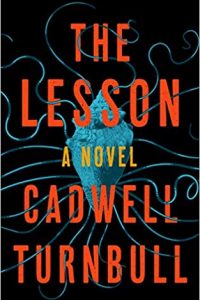Gary K. Wolfe Reviews The Navigating Fox by Christopher Rowe
 The Navigating Fox, Christopher Rowe (Tordotcom 978-1-250-80450-1, $18.99, 160pp, tp) September 2023.
The Navigating Fox, Christopher Rowe (Tordotcom 978-1-250-80450-1, $18.99, 160pp, tp) September 2023.
Given what we think we know about foxes from just about every animal fable everywhere, the very title of Christopher Rowe’s The Navigating Fox seems to suggest treachery. Foxes, after all, are inveterate tricksters, and the idea of hiring one to lead you on a quest of any sort would seem to be a recipe for disaster. And that is indeed what happens when Cynthia Benedictus hires the narrator, Quintus Shu’al, who introduces himself as the world’s only navigating fox, to lead her group to a distant mountain range in search of certain salts which might cure an ailing empress. Only Quintus himself returns. Not surprisingly, this doesn’t do much for his reputation as a navigator, and a year later Cynthia’s sister Octavia Delphina brings charges against him in an effort to have him expelled from the Sodality of Explorers. A High Priest, Scipio Aemilanus, instead persuades the assembly to hire Quintus again, this time to lead an expedition to find the gates of Hell, ostensibly to seal them off and thus put an end to death (in the cosmology of Aquacolonia, the alternate Roman-like empire where the story takes place, everyone who dies first goes to Hell).
But Quintus is no simple trickster in the Reynard the Fox mold, even though he has a lot up his paw. He’s a ‘‘knowledgeable creature,’’ one of a limited number of animals who have been given, through some alchemical process, human-level intelligence and skills – tortoise librarians, baboon accountants, calculating parrots, etc. – and he’s accompanied on his new mission by a delightful pair of cartographer raccoons, a diplomat bison, a mysterious crow, Scipio Aemilanus himself – and an openly hostile Octavia Delphina, recruited by Scipio even though she still blames Quintus for her sister’s disappearance. Subsequent chapters alternate between the current journey and Quintus’s account of what really happened on that earlier ill-fated quest. Needless to say, there are surprises to be learned about the background of each expedition, as well as hidden motives that rise to the surface and a few characters who turn out not to be quite what they first seemed. What had initially seemed an entertaining animal fable morphs into a quest tale, a philosophical fiction, a mystery, and a dark satire of both human and animal nature, all without losing the suspenseful forward movement of its dual narratives.
Rowe’s setting is almost as intriguing as his characters. As the character names suggest, it seems based on a kind of alternate Roman history, and references to the Eternal City, the Mare Nostrum (and an ‘‘enormous continent’’ south of it), Anatolia, the large swaths of land controlled by local populations (some of which the explorers must pass through), even hints of other continents across a great ocean. Just as the story borrows from a rich variety of narrative traditions, this world is partly recognizable geography, partly medieval cartography, partly the story-space of legend and fable. Mostly, though, it’s a magical world of Rowe’s own invention, and, like The Navigating Fox as a whole, it’s not quite like anyplace we’ve been before.
Gary K. Wolfe is Emeritus Professor of Humanities at Roosevelt University and a reviewer for Locus magazine since 1991. His reviews have been collected in Soundings (BSFA Award 2006; Hugo nominee), Bearings (Hugo nominee 2011), and Sightings (2011), and his Evaporating Genres: Essays on Fantastic Literature (Wesleyan) received the Locus Award in 2012. Earlier books include The Known and the Unknown: The Iconography of Science Fiction (Eaton Award, 1981), Harlan Ellison: The Edge of Forever (with Ellen Weil, 2002), and David Lindsay (1982). For the Library of America, he edited American Science Fiction: Nine Classic Novels of the 1950s in 2012, with a similar set for the 1960s forthcoming. He has received the Pilgrim Award from the Science Fiction Research Association, the Distinguished Scholarship Award from the International Association for the Fantastic in the Arts, and a Special World Fantasy Award for criticism. His 24-lecture series How Great Science Fiction Works appeared from The Great Courses in 2016. He has received six Hugo nominations, two for his reviews collections and four for The Coode Street Podcast, which he has co-hosted with Jonathan Strahan for more than 300 episodes. He lives in Chicago.
This review and more like it in the October 2023 issue of Locus.
 While you are here, please take a moment to support Locus with a one-time or recurring donation. We rely on reader donations to keep the magazine and site going, and would like to keep the site paywall free, but WE NEED YOUR FINANCIAL SUPPORT to continue quality coverage of the science fiction and fantasy field.
While you are here, please take a moment to support Locus with a one-time or recurring donation. We rely on reader donations to keep the magazine and site going, and would like to keep the site paywall free, but WE NEED YOUR FINANCIAL SUPPORT to continue quality coverage of the science fiction and fantasy field.
©Locus Magazine. Copyrighted material may not be republished without permission of LSFF.






